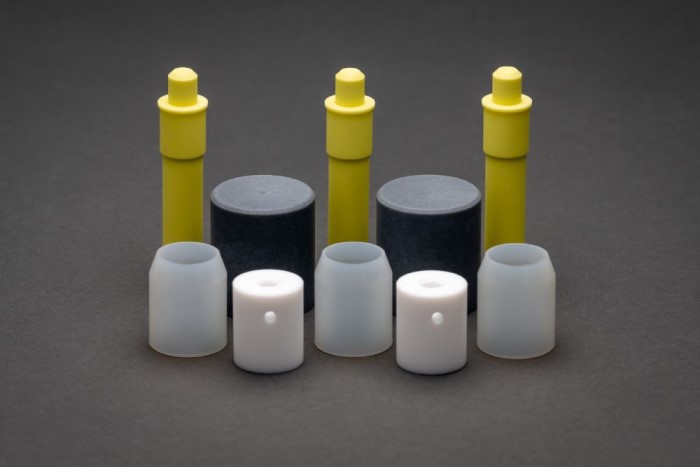
Wire insulation is a highly vital component in preventing electrical short-circuiting. There are several different types of wire insulators that you can choose from, and each of these materials has its pros and cons.
For example, you can use PVC wire, but it does not have the same heat or cold resistant properties as Teflon insulators. If you want to learn more about Teflon insulators and how you can use them in your industry’s applications, continue reading below. We will cover all you need to know about Teflon insulators and who you can contact for more information.
Teflon is one of the most popular and well-recognized brand names for PTFE (polytetrafluoroethylene). PTFE is a type of plastic commonly used to coat several products to create a non-reactive, corrosion-resistant, and waterproof barrier. PTFE is extensively used throughout construction, aerospace, and other industries. Most of these companies utilize PTFE to protect their wires, gears, pipes, and cables.
PVC, also known as polyvinyl chloride, is a durable thermoplastic material that can provide several beneficial characteristics in wire insulation. For example, PVC is flame and moisture resistant, and it also can withstand temperatures ranging from -67°F to 221°F. This material is also resistant to acids, alkalis, and other types of chemicals. This option is less expensive, making it a popular choice, but it isn’t as strong as Teflon.
As mentioned above, Teflon insulators are commonly used in several different applications across different industries. For example, they are widely used in computer and electronic industries. Teflon is routinely used to insulate circuit boards in various electronic devices. It is imperative to have Teflon electrical insulation to ensure the usability of a device’s electronic components. Cell phones, air conditioners, and computers are common devices that use Teflon electrical insulation.
The non-friction and non-stick properties of Teflon make it ideal for gears and metal sliders in the automotive industry. These sliders and gears are coated with PTFE to reduce friction and ensure that an engine’s internal components stay undamaged. Teflon has the potential to resist extreme temperatures, making it an excellent candidate for airline applications.
Teflon is also commonly used to coat different tools and equipment in medical settings. This is because the coating can be treated to resist corrosion and other types of chemical agents. Teflon also plays a crucial role in maintaining bacteria-free environments. Some laboratories develop microbial cultures for research purposes, and many of the utensils they use have Teflon coating. This coating does not interfere with the development of those cultures.
Teflon is an excellent, non-reactive, and resilient material that has the potential to withstand high temperatures ranging between -456° F to 600° F. This makes Teflon an exceptional insulator for electrical applications.
PTFE is made up of flexible carbon-fluorine bonds, so even after significant amounts of stressing and bending, it will still stay intact. The wires cannot be cross-linked and have a reliable and long life. The extreme durability of this material ensures that electronic components will have long-lasting protection.
Teflon is an excellent material for several different electric applications, and there are many companies, such as Severna, that can produce a variety of Teflon insulators. For example, if you need bearings, bushings, or gears, you can reach out to Severna.
Additional insulation products:
There are several advantages to using Teflon for electrical insulation jobs. These parts work longer and more effectively than alternatives and can easily be incorporated into various applications.
As mentioned earlier, one of the most significant advantages of Teflon insulators is their resistance to extreme temperatures. Electronic components may be exposed to extreme cold or hot weather in electrical applications. When this happens, you’ll want to make sure that no type of moisture gets into the electrical components. If they do, you will have to throw away those products because they will most likely not work, eventually cutting your business’s bottom line.
As you now know, Teflon is an excellent insulator for electrical cables and wires. Thanks to their complex chemical makeup, the material doesn’t allow electrons to pass through, providing resilient and extremely safe electrical insulation. In addition to that, Teflon naturally repels moisture away, making electrical components waterproof.
Regardless of your company’s industry, you can use Teflon to protect your materials. For example, if you are in the aerospace industry, you will want your products to resist water and insulate electrical components. If you are in the culinary or food industry, you will want your cooking products to withstand certain temperatures.
Teflon materials exhibit low friction properties, which provide reduced wear and keep your components in good working condition for a long time. This makes Teflon ideal for industrial applications that involve gears or other moving parts that slide up against one another.
Corrosion resistance is another main reason why many companies turn to Teflon. Companies with electrical components need their materials to be able to resist corrosion. If not, it can cause the electrical system to go awry, resulting in failures.
It is essential that you choose the best type of wire insulation to ensure that your products function optimally and deliver extended service lives. Teflon insulators are among the most popular materials used for electrical insulation applications because of their many benefits.
Contact us now if you are in the market to partner with a reputable manufacturing company to create your Teflon insulators. Our team is ready to answer any questions or concerns about the process.